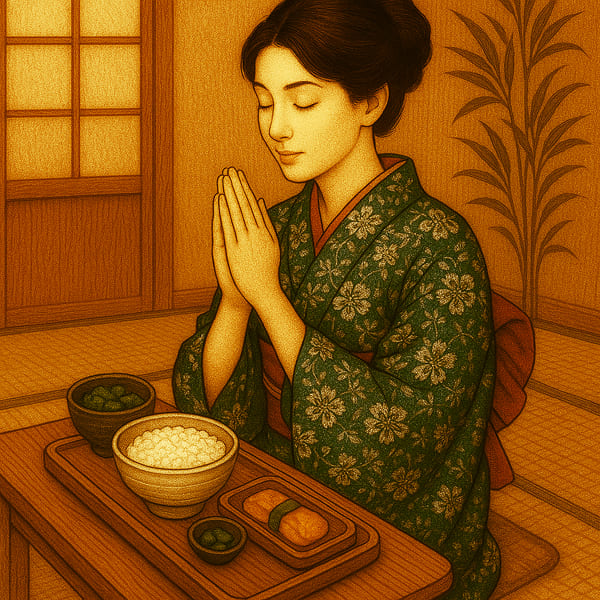Itadakimasu and Gochisousama: The Deep-Rooted Culture of Gratitude in Japanese Mealtime Traditions

A simple phrase before and after every meal—and yet, a profound reflection of Japanese values.
In Japan, meals begin with a soft “Itadakimasu” and end with a heartfelt “Gochisousama.” These expressions are far more than table manners—they are acts of mindfulness, showing respect for nature, gratitude to those who prepare the food, and awareness of the life that sustains us.
With every bite, these words connect the eater to the hands that planted, harvested, cooked, and served. In a world where food is often consumed without thought, Itadakimasu and Gochisousama offer a quiet moment of reflection—and a timeless reminder of humility, connection, and appreciation.
The Meaning and Significance of "Itadakimasu"
"Itadakimasu" (いただきます) is commonly translated as "I humbly receive." It is said before beginning a meal and serves as a moment of reflection and thanks.
This phrase expresses gratitude to:
- Farmers and producers who grew the ingredients
- Chefs and cooks who prepared the dish
- Nature and life itself, for providing the meal
Saying "Itadakimasu" acknowledges that eating involves accepting the lives of plants and animals for our nourishment. It’s not just a routine—it's a gentle reminder of the cycle of life and our place in it.
The Meaning and Origin of "Gochisousama"
"Gochisousama" (ごちそうさま) is said after finishing a meal and roughly means "Thank you for the feast."
- The word “gochisou” originally referred to the act of running about to prepare a special meal.
- Over time, it came to symbolize hospitality, effort, and care.
Today, saying "Gochisousama" expresses appreciation not only for the food, but for the time, energy, and love poured into preparing and serving it. This applies whether you're at home, a restaurant, or even receiving a meal from a convenience store.
Everyday Conversation Examples
These expressions are commonly used in daily life. Here's how they appear in simple conversation:
Before Eating:
Friend: "Let’s eat!"
You: "Itadakimasu!"
After Eating:
You: "Gochisousama deshita. That was delicious!"
Host: "I’m glad you enjoyed it!"
These short exchanges show how Japanese mealtime phrases blend gratitude with connection, even in casual settings.
A Culture of Gratitude Expressed Through Meals
Together, Itadakimasu and Gochisousama capture the spirit of gratitude deeply rooted in Japanese culture.
These phrases:
- Promote mindfulness about what we consume
- Encourage respect for food and those who provide it
- Reinforce interpersonal appreciation, even in daily routines
In contrast to fast-paced modern lifestyles, this custom invites people to pause, reflect, and give thanks—making every meal more meaningful.
Respect for Food and the Japanese Heart
In Japan, respect for food is synonymous with respect for life. The act of eating is treated with intention, humility, and harmony.
Saying “Itadakimasu” and “Gochisousama”:
- Honors the natural world
- Strengthens human connections
- Reflects the cultural values passed down through generations
These seemingly small phrases carry the weight of centuries of tradition and continue to nourish not just the body—but the spirit as well.
Final Thoughts
Whether you're enjoying sushi at a bustling Tokyo restaurant or a simple homemade meal, pausing to say Itadakimasu and Gochisousama connects you to a deeper layer of Japanese culture.
It’s more than politeness—it’s a daily practice of gratitude, one that turns every meal into a quiet ceremony of appreciation.